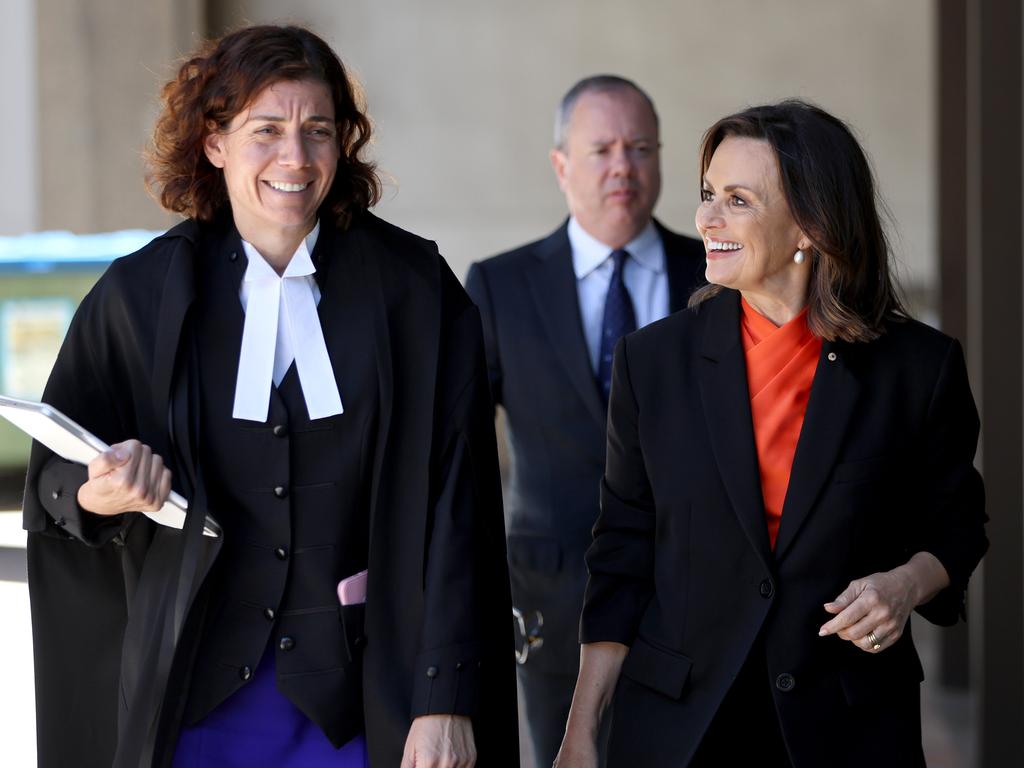Astounding act of Brittany Higgins’ Mr Fix-It lawyer Leon Zwier
In the midst of an already bitter legal battle, Brittany Higgins’ personal lawyer, Leon Zwier, lobbed a grenade at Lisa Wilkinson – the woman fighting to prove his client was a rape victim.
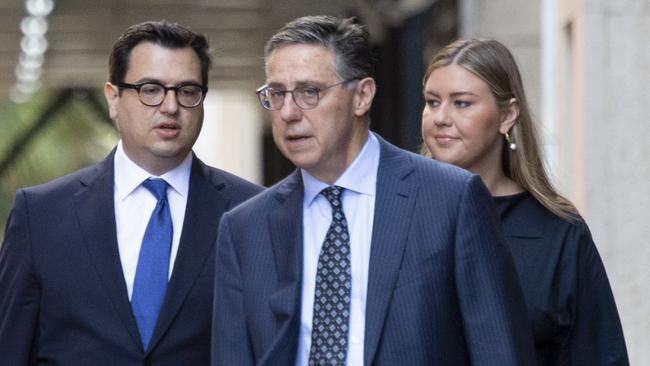
Last week was the three-year anniversary of Lisa Wilkinson’s interview with Brittany Higgins on The Project.
Don’t break open the champagne. There may come a time when we can draw a line, with a mix of celebration and relief that there are no more gobsmacking revelations.
But it hasn’t arrived yet.
This saga, which started five years ago with Higgins’ allegations of rape and political cover-up, reached a crescendo of legal madness last week.
When Network Ten baulked at paying Wilkinson’s legal bills after she decided she needed her own lawyers, the public got to see, as Justice Michael Lee wrote in a judgment released this week, “how the sausage was made”.
It wasn’t pretty.
Wilkinson’s claim against her estranged employer produced thousands of pages of previously secret documents. But when Lee delivered his verdict in favour of The Project host, he singled out one email in particular: an extraordinary demand by Higgins’ personal lawyer, Leon Zwier.
Higgins would help the defence in Bruce Lehrmann’s defamation case, Zwier suggested, only if the TV star dumped her high-profile silk, Sue Chrysanthou SC.
The possibility of losing the most crucial witness in the case left many of the participants – on all sides of this three-cornered contest – gobsmacked.
Wilkinson, who believed Higgins was her friend, called it “the weaponisation of an alleged rape victim”.
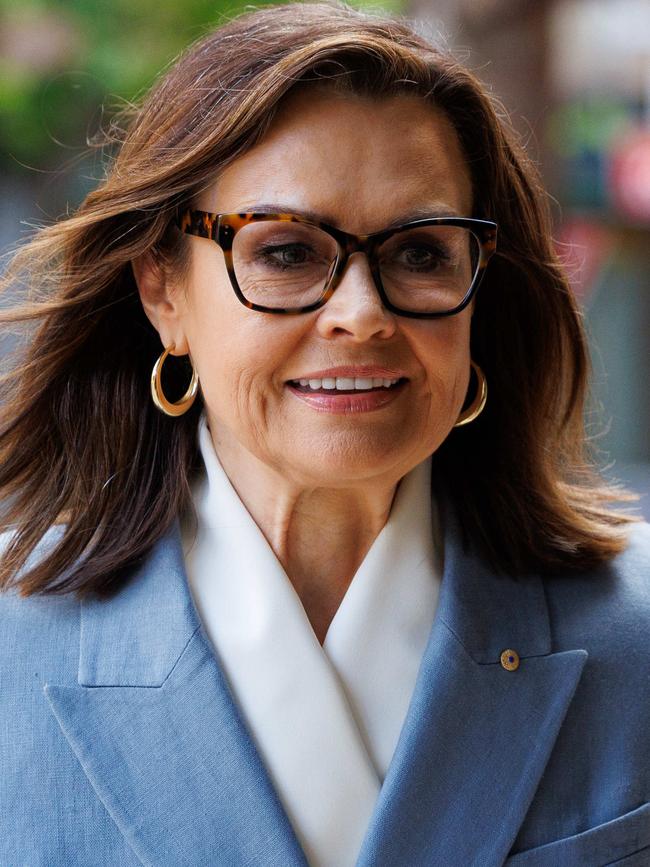
In the midst of an already bitter behind-the-scenes battle between the main protagonists, Zwier had lobbed a grenade at the woman fighting to prove his client was a rape victim.
There was a short pause in the defamation proceedings when champagne did flow. It was Friday December 22 last year.
The month-long trial had drawn to a close. Justice Lee invited all barristers, solicitors and his associates into his chamber that evening for a glass of bubbles. It was, by all reports, a chirpy gathering. No one talked about the case, needless to say.
The one lawyer missing was Zwier. Higgins’ lawyer wasn’t invited given his client was a witness, not a party, in the legal proceeding.
But Zwier has been central to this salacious saga at many junctures.
Team Brittany
When Bruce Lehrmann’s rape trial began in October 2022, even seasoned aficionados of the saga were puzzled by the appearance of a bespectacled, neatly tailored man who marched alongside Higgins in front of the cameras.
The rest of Team Brittany they recognised: Higgins’ partner, David Sharaz; her best friend and former Katy Gallagher staffer Emma Webster; and support person and ACT Victims of Crime Commissioner Heidi Yates.
Where had Zwier come from?
The 66-year-old Melbourne lawyer is certainly a star in commercial legal circles. He has acted for Indigenous families in the Hawthorn AFL club racism scandal, cricketer Steve Smith, comedian Steve Vizard, and politicians Tony Abbott and Bill Shorten.
Last year, he was sent to London by Dan Andrews to negotiate a payout with the 2026 Commonwealth Games organisers after the then premier reneged on a deal to hold the Games in Melbourne, a move likely to cost the Victorian taxpayer close to $400m.
A 2017 profile in this newspaper described Zwier as the man the big names turn to when, as one client put it, “the shit hits the fan”.
In the Higgins case, it appears there has been some blowback.
The restructuring and insolvency specialist didn’t have any obvious background in representing sexual assault complainants.
As it happens, Zwier had been involved in a case with uncanny similarities to the Higgins affair. But in October 2022, the court watchers were more intrigued by what had become of Higgins’ previous legal team, high-profile silk Sue Chrysanthou SC and defamation specialist Rebekah Giles.
Chrysanthou and Giles had been acting pro bono for Higgins in the period after The Project first aired her claims, until mid-2021. Political commentator Peter van Onselen, then a regular host on the Network Ten show, had introduced Higgins to the lawyers.
While the extent of their work retainer with Higgins is unknown, the Sydney power duo had given Higgins advice in her dealings with the ABC’s Four Corners, secured a payout from Liberal minister Linda Reynolds over her “lying cow” gibe and a settlement over comments by a radio shock jock in Adelaide. They’d also acted for Higgins during her tense discussions with Scott Morrison over her claims of a political cover-up by Liberal ministers.
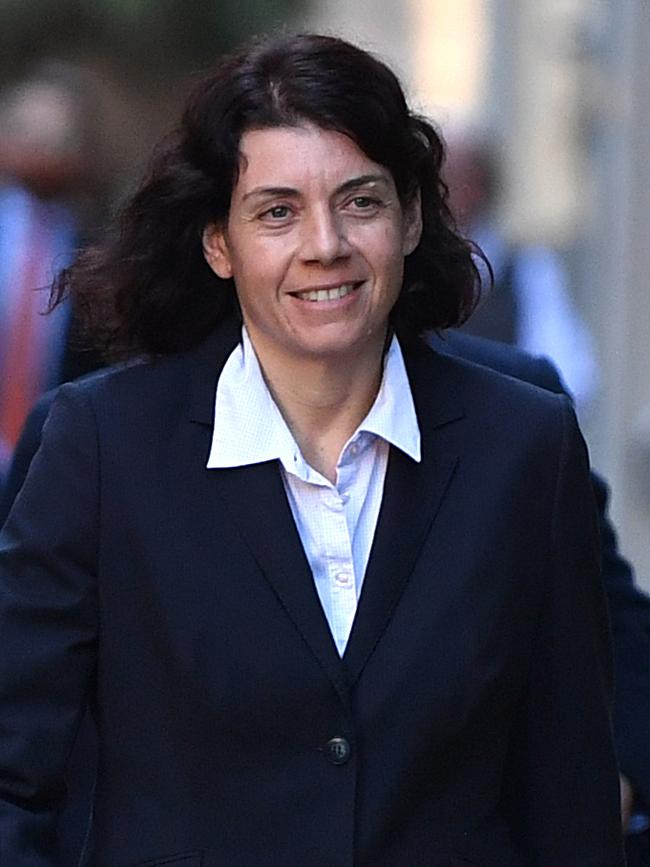
It’s still unclear how Zwier came to be acting for Higgins. Zwier, Chrysanthou and Giles all declined to be interviewed.
Sources suggest that, in retrospect, it was likely a “bullet dodged”. Given how the Higgins saga unfolded, Higgins and Sharaz may not have been “the right fit for Giles or Chrysanthou”, with one describing Sharaz’s management of Higgins as akin to a “pageant mum”.
The trial ends
It’s clear Higgins was grateful for Zwier’s support during the rape trial. When it was aborted after 12 days of evidence because of juror misconduct, Higgins walked outside and gave a speech in which she thanked Zwier “who I have stolen from his family for a really long time”.
But it was the rest of her speech, highly prejudicial to any future trial, that appalled many lawyers.
Higgins claimed the criminal justice system had “long failed to deliver outcomes to victims of sexual assault”, wrongly asserted that Lehrmann had not been forced to surrender his mobile phone, and stated that he had not been held accountable for “his actions”.
Lehrmann’s defence barrister, Steve Whybrow SC, referred the speech to police for effectively stating that his client was guilty, but no action was taken. Lehrmann was never convicted and maintains his innocence.
Zwier did not respond to questions from The Weekend Australian about whether he had prior knowledge of the speech.
Yates told the Sofronoff inquiry she hadn’t spoken to Higgins about the wisdom of giving the speech because she was aware that Higgins and Zwier “had been working on the matter of that statement which we – for some time, and even that Mr Zwier, I understood, had some engagement with (ACT DPP Shane) Drumgold about the fact that Ms Higgins was intending to do a statement”.
During the defamation trial, Whybrow told Lee he wanted to put the proposition to Higgins that she was “doing everything she could to make sure there would not be another trial” but after an exchange with the judge agreed to approach the issue differently.
A few weeks after the mistrial, Drumgold announced he was abandoning a second trial out of concern for Higgins’ mental health, saying he had received reports from two independent medical experts that her life was at serious risk.
The criminal case against Lehrmann was dead but so was any chance of him being exonerated of the crime.
Drumgold administered the coup de grace by declaring in his speech he still believed there was “a reasonable prospect of conviction”, a statement slammed by Board of Inquiry head Walter Sofronoff KC as “improper … and a failure of his duty as DPP”.
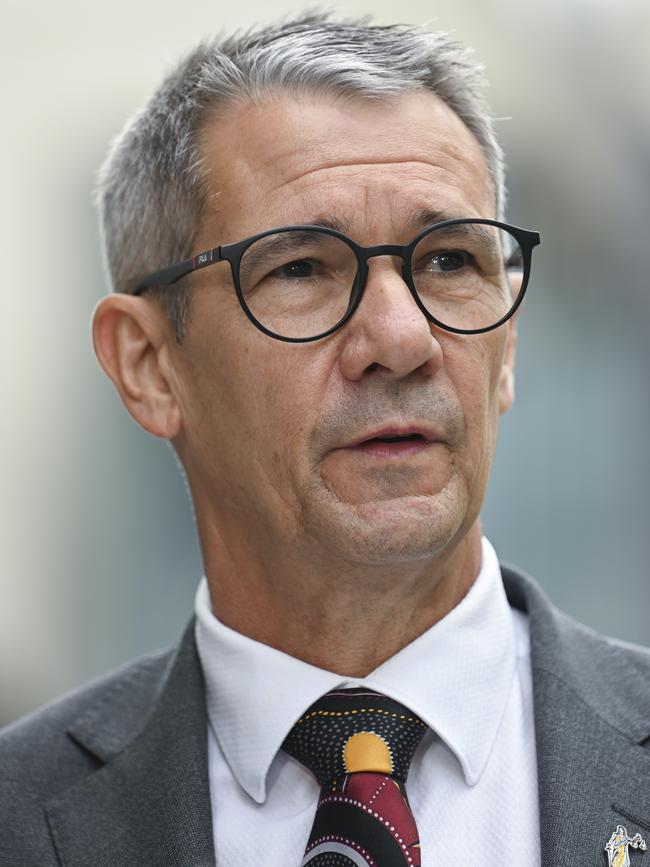
If Lehrmann wanted his day in court, he’d have to bring a case for defamation, in a civil court where any truth defence argued by his accusers attracts a lower standard of proof.
The psychiatrists’ reports that brought about this dramatic conclusion to the criminal case were never tendered in court, and the doctors were never identified.
The mystery may have remained just that until a secretly recorded conversation in a Sydney bar raised a tantalising possibility: was at least one of the “medical reports” written by Leon Zwier?
The bombshell tape
The plush lobby bar of Sydney’s Park Hyatt Hotel isn’t the best place to have a private conversation, even on a relatively quiet Monday night.
But that’s where Zwier, Sharaz and Webster ended up at 9.30pm on December 4 last year, after a day in which Higgins testified in the defamation case Lehrmann had now brought against Ten and Wilkinson.
Higgins was in the middle of cross-examination and therefore barred from speaking to her lawyer – or anyone else – about her evidence. She wasn’t at the bar, but somebody at a nearby table recognised the group.
That wasn’t surprising. The trio had once again been marching into court with Higgins in front of the cameras, and were the lead story on every TV bulletin and newspaper front page in the country. The curious neighbour at the bar reached for their phone and hit record.
“She’s terrified she’ll go to prison,” Sharaz can be heard telling Zwier on the tape, initially revealed by Sky News.
“She’s not going to go to prison,” Zwier assures him.
The pair discuss how Higgins should field questions while in the witness box.
The week before, Whybrow had indicated he would pursue Higgins over whether she intentionally made a speech on the courthouse steps after Lehrmann’s criminal trial was aborted, to botch any potential retrial.
Lee had taken the weekend to determine if he would allow it.
In the audio, Zwier can be heard saying: “If she’s asked, did you get legal advice about that, ‘yes’. What was the advice? She should say, ‘privilege’.
“You know, ‘your honour, I am told by my lawyer I don’t have to discuss legal advice’ – that’s what she should say.”

The Weekend Australian is not suggesting Zwier intended his comments to be passed on to Higgins, nor that his comments were passed on to Higgins, and there is no evidence that Sharaz or Webster gave her any subsequent instruction. Nonetheless, some in the legal community were shocked at news of the conversation.
When the recording initially surfaced, Zwier told Sky News: “All my private conversations with David Sharaz and Emma Webster were on the common understanding that Brittany was under cross-examination and no one was to talk with her about the substance of her evidence or the manner in which she was giving it.”
But the most remarkable part of the conversation wasn’t about what evidence Higgins might give. It was about what Zwier boasted of having done on her behalf.
Zwier tells the group that he, not a doctor, drafted the medical report that detailed her anxiety and suicide attempt which was used by Drumgold to abort the rape case against Lehrmann.
After opening his laptop at the bar, he read aloud the medical report, according to the Sky account tendered.
“Yeah I gave him the draft, I wrote it,” Zwier said.
“Let me brief you,” he said, before reading a statement from doctors that he received on October 9.
Lee granted a request by Lehrmann’s legal team to issue a subpoena to Sky News for the recording. But at the end of the week, with time running out, Whybrow told Lee the quality of the recording wasn’t good enough for it to be tendered in evidence or for him to “make any applications in this proceeding”.
However, Lee left the door open for the tape to be further interrogated in the future.
“The question is what, if anything, occurs in relation to (the tape),” he said.
“But that’s not a matter relevant to the determination of the facts in these proceedings.”
In a brief statement to The Weekend Australian, Zwier said: “I act on clients’ instructions. The lawyer-client relationship is protected by legal professional privilege. Two medical reports were provided to the ACT Director of Public Prosecutions before he discontinued the criminal proceeding. They were written by qualified medical practitioners.
“I do not use unlawfully obtained and unverified recordings of private conversations.”
Zwier declined to answer a specific question: if he didn’t draft the medical report, why did he tell Sharaz he had?
Mr Fix-It
Property mogul Rino Grollo named a difficult, twisting ski run at Mount Buller the “Zwier Zig Zag”, apparently in tribute to his favourite lawyer’s habit of confounding his opponents with sharp turns. Zwier helped Rino and Bruno Grollo defeat tax fraud charges brought by the ATO.
The lawyer’s admirers call him Mr Fix-it – the best insolvency practitioner in the country. His detractors call him overconfident. Two-faced. A bully. Labels he has previously rejected.
Well before the Lehrmann defamation trial kicked off, Zwier wanted Chrysanthou removed as Wilkinson’s barrister. She is a boisterous, sometimes abrasive and forceful advocate for her clients. She had won a number of defamation cases against The Project. Zwier wasn’t the only lawyer who didn’t like her but he clearly had an issue with the Sydney silk.
He told Ten’s lawyers Higgins – the most crucial witness in the case, but not a party to it – had instructed him not to assist Chrysanthou in defending the action and would help only if Wilkinson used the same lawyers as the network.
In an email to Ten’s lawyers, made public when documents were released by the Federal Court last week, Zwier said he was not prepared to work with Chrysanthou “under any circumstances”.
“And the more Brittany is required to deal with differing lawyers, the worse it is for her to manage the civil trial process to the detriment of those defending Lehrmann’s civil claims,” Zwier wrote.
“If Lisa Wilkinson subsequently elects to retain the same lawyers as Ten, then the process will be smoother, more orderly and manageable.”
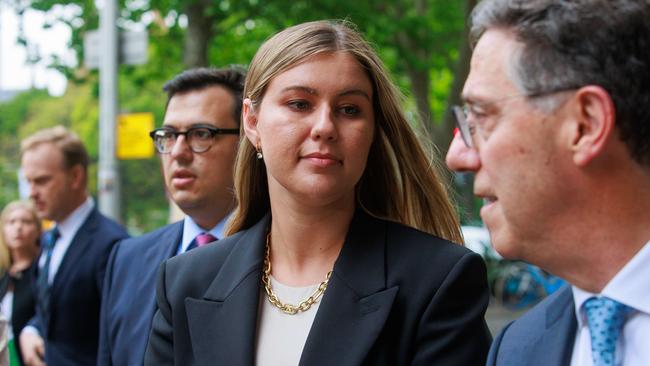
Ten didn’t waste Zwier’s extraordinary email. Network boss Bev McGarvey sent it directly to Wilkinson. Legal protocol should have meant that an email sent to Ten’s lawyers be sent to Wilkinson’s lawyers. Instead, McGarvie cut Chrysanthou out of the loop, telling Wilkinson that it was confidential.
Why was Ten desperate to get one of Sydney’s most high-profile and successful defamation lawyers out of the picture?
Their senior in-house lawyer Tasha Smithies, who was forced last week to defend legal advice about Wilkinson’s Logies speech that derailed and delayed a criminal trial, told the Federal Court it was because Chrysanthou had acted against The Project, she acted mostly for plaintiffs and didn’t have “deep experience” acting for mass media groups.
Moreover, Chrysanthou had once “cross-examined a junior lawyer at Network Ten … to an extreme and unnecessary extent”.
Smithies didn’t mention the name of the legal bunfight where Chrysanthou had allegedly cross-examined a Ten lawyer so fiercely.
Could it have been in Hafertepen v Network Ten?
The Silicon Balls case
In 2018 The Project ran a story called Justice for Jack. Dylan Hafertepen, an American, claimed that the program suggested he was responsible for the death of his lover, Jack Chapman, by inducing him to inject silicone into his testicles.
Ten settled, but bizarrely hid the agreed clarification statement at the very bottom of the website’s “Terms of Use” page. The case went back to court.
Sources have told The Weekend Australian that the young Network Ten lawyer Smithies mentioned in her affidavit to Lee was Myles Farley.
In what became known as the Silicon Balls case, Justice Anna Katzmann slammed Farley, describing him as “not credible” and an “unsatisfactory witness,” following Chrysanthou’s cross-examination.
Worse, Katzmann slammed Ten as acting in “ bad faith”.
Little wonder Smithies didn’t mention the name of the case in her affidavit.
She and Network Ten were already copping enough flack in the Federal Court in front of Lee.
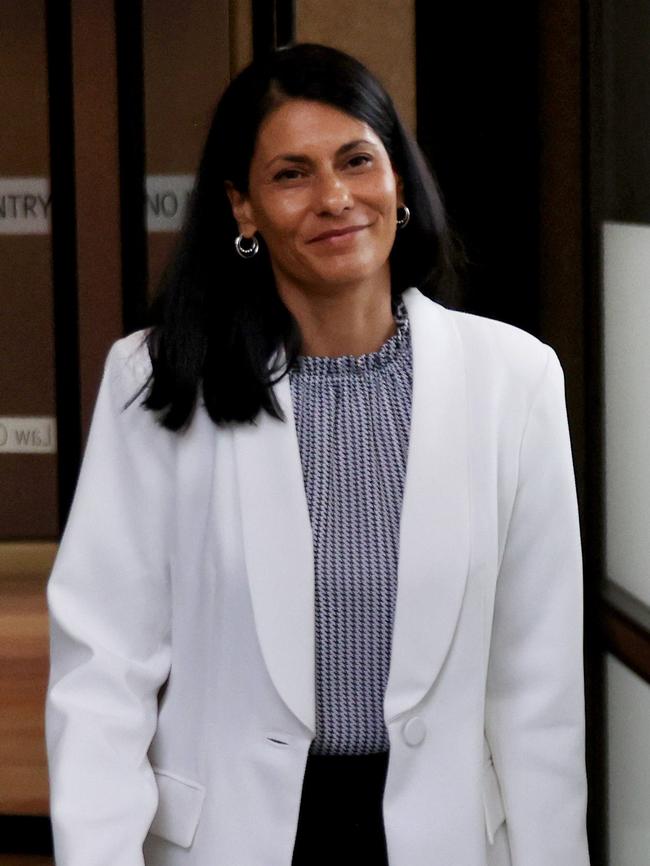
The trove of documents released by the court last week reveal Wilkinson was horrified by Zwier’s claim to be acting on instructions from Higgins and accused Ten of engaging in the “weaponisation of an alleged rape victim”.
Zwier’s astonishing demand was questioned by eminent silk Bret Walker SC and leading defamation lawyer Patrick George, from whom Wilkinson had sought advice, at Ten’s direction, on the network’s refusal to pay her legal costs.
“This stipulation is at the least unwise made by a witness and offered in return for the witness’s assistance in the proceedings,” the lawyers said.
Lawyers who have spoken to The Weekend Australian used stronger language to describe Zwier’s intervention.
When Lee learnt of the demands during Wilkinson’s cross-claim against Ten to pay her legal costs, he was scathing of the strategy.
“Network Ten were maintaining that it was appropriate (Wilkinson) not have counsel of her choice because a lawyer for one of the witnesses was saying ‘well, I’m not going to co-operate with her’,” Lee said.
The judge observed that if a witness had said that to him when he was a solicitor, he would have served a subpoena on them the next day and told them: “How dare you say who can represent my client?
“I mean, it’s quite extraordinary,” Lee added.
“What, (Higgins) is going to turn up at court and say, ‘I want to set aside the subpoena to give evidence because I don’t like that person at that end of the bar table’?”
The Weekend Australian understands that within Arnold Bloch Leibler – a rather dour and blue ribbon Melbourne law firm – not everyone is happy with Zwier’s involvement in the national scandal.
Bad blood
Why did Zwier tell Ten’s lawyer, in that unusual March 2023 email, that he would not “under any circumstances” work with Chrysanthou?
The Melbourne corporate recovery services lawyer had never appeared in court opposite the Sydney defamation lawyer.
But the two high-profile lawyers did cross swords in the Geoffrey Rush defamation trial.
Zwier wasn’t acting for any party to those legal proceedings between Rush and The Daily Telegraph. Instead, as in the Lehrmann case, Zwier represented the main witness, in this case actor Eryn Jean Norvill, who made claims that Rush had acted inappropriately during a Sydney Theatre Company production of King Lear in 2015.

On a Friday evening, around 8pm, just days before Norvill was due to enter the witness box, Zwier initiated an unusual discussion. Hooked into that phone call, at Zwier’s request, was a court mediator and Rush’s legal team, solicitor Nicholas Pullen and his barrister, Chrysanthou.
The Daily Telegraph – the party being sued – was not invited.
Zwier said that he acted for Norvill and for a second witness Yael Stone.
In an affidavit filed three days later with the court, Pullen recounted that Zwier said Stone would go public – the trial was under way – with claims about Rush if the matter was not dealt with “privately”. Zwier mentioned that “an option might be to mediate a process”.
Zwier’s intervention was raised in court the following week. When the judge learned that the lawyers for News (which owns both this newspaper and The Daily Telegraph) were not parties to a conversation about a mediation initiated by Zwier, Justice Michael Wigney remarked: “Well, there you go. I’m glad I put ‘mediation’ in inverted commas”.
Others close to the case described Zwier’s intervention as a “farce”. Zwier, after all, was not acting for a party to the proceedings so his role in any possible mediation was baffling to say the least.
Was Zwier intervening with a suggestion of a private mediation to bring the high-profile trial to an end before his client, Norvill, gave evidence?
Norvill’s credibility was critical given The Daily Telegraph ran a truth defence, similar to Ten and Wilkinson’s defence in the Lehrmann matter.
Devastation
Mr Fix-it didn’t fix it for Norvill.
The following day, Pullen told the registrar “that Mr Rush doesn’t want to engage any further with Mr Zwier”.
One senior person close to the Rush case said when they learned that Zwier was acting for Norvill, they assumed it would be good for News, helping a central witness work in tandem with News’s truth defence.
That didn’t happen. Zwier, they say, came between Norvill and News. Zwier’s role was, of course, to act in the best interests of his client, not News’s.
But the result of the case was patently devastating for Norvill with the judge awarding Rush $2.9m and describing Norvill as “prone to exaggeration and embellishment”.
The Weekend Australian asked Zwier why, almost five years later, as lawyer for Higgins, the main witness in the Lehrmann defamation suit, he was not prepared to work with Chrysanthou. We got no answer. Was it, as some sources have suggested, a bruised ego from the Rush matter?
Did the usually canny lawyer expect that March 2023 email would not become public – bundled up with Network Ten’s legal dirty laundry and under normal circumstances protected by legal professional privilege – during the cross-claim just over a week ago?
Zwier declined to say whether he had ever previously refused to work with a lawyer acting for another party.
Lee, who told the parties last week he “had not been idle” since Christmas, planned to deliver his decision in the defamation case next month. But after the cascade of enlightening documents from Wilkinson’s cross-claim against Ten – which now form part of the main evidence, thanks to Ten’s own goal – judgment is not expected until early April.
Whether Zwier’s bid to eject Chrysanthou figures in Lee’s verdict remains to be seen.
Four months after that incendiary email to Ten’s lawyers, Zwier was interviewed by legal magazine, Justinian. The Melbourne lawyer was asked to describe his greatest weakness.
“I bear long-term grudges. Next question,” Zwier replied.

